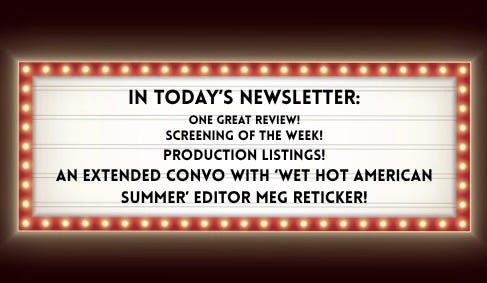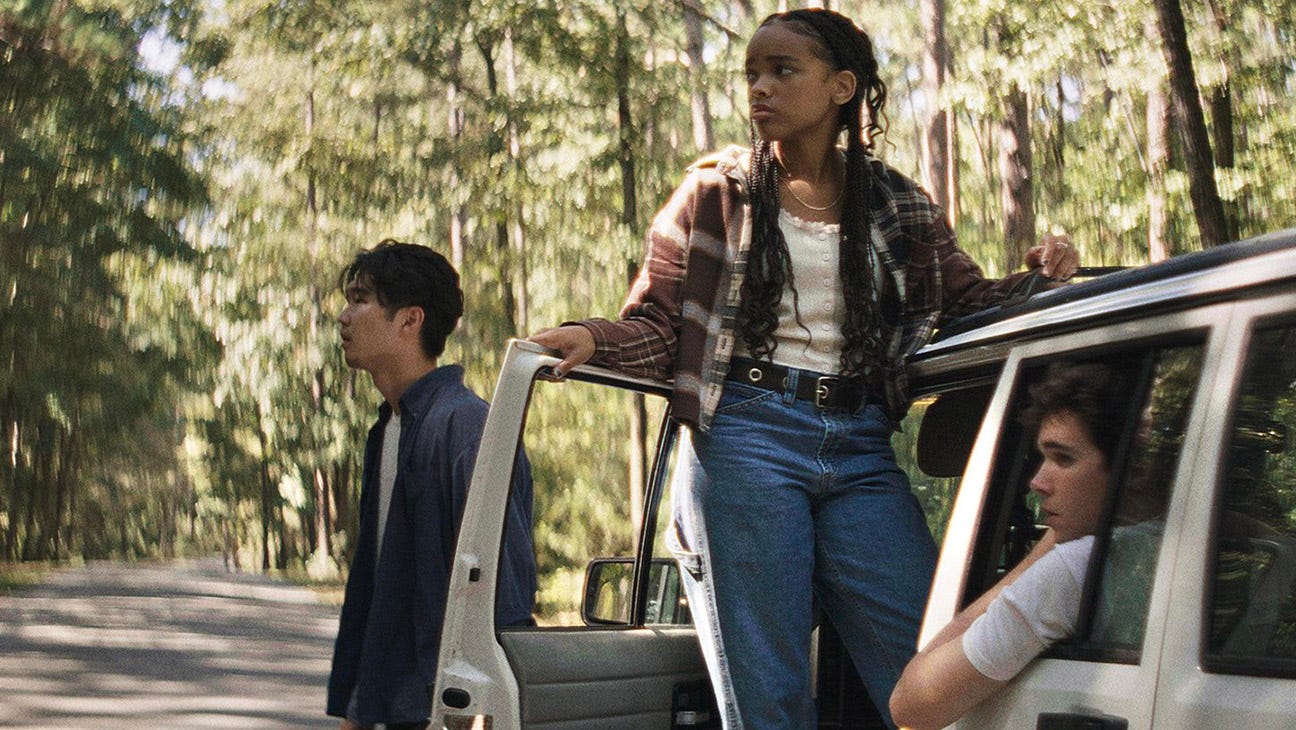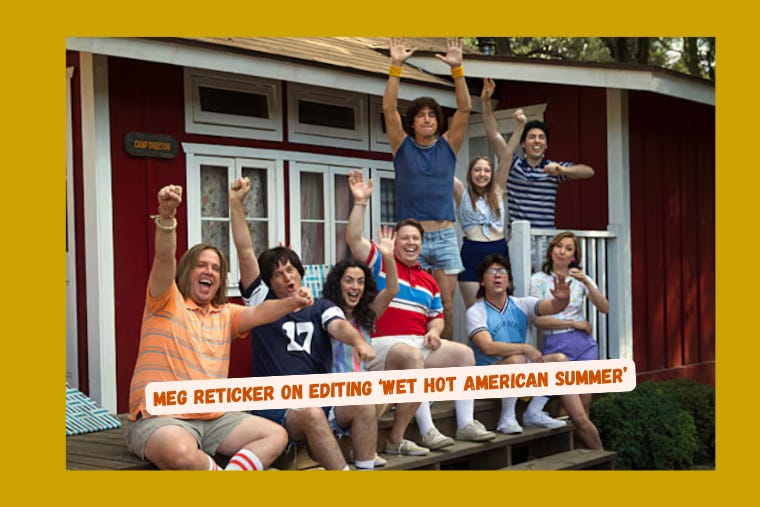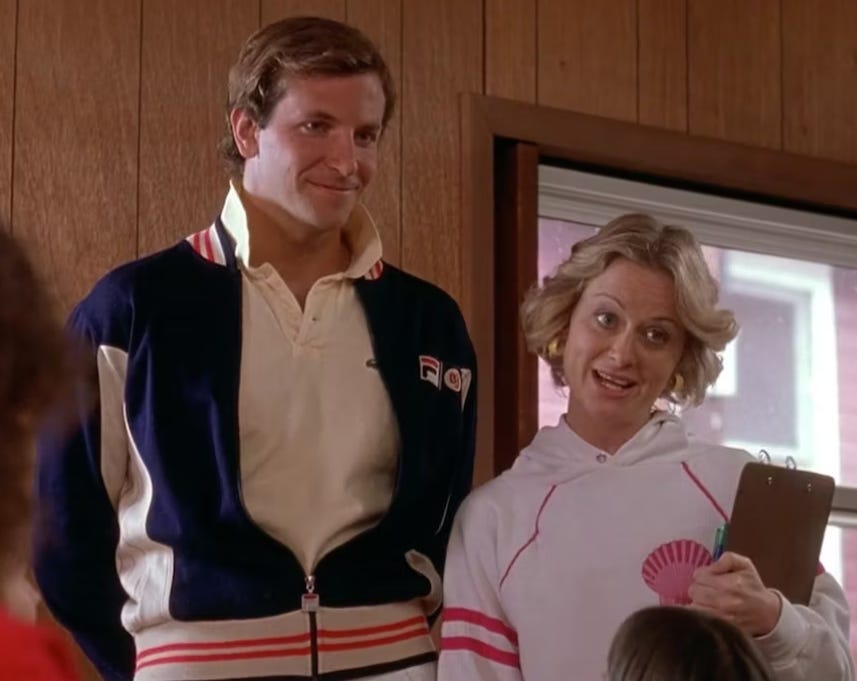Editing 'Wet Hot American Summer'
Editor Meg Reticker reflects on why the film's style of comedy stood out in 2001, finding the film's structure, and her favorite jokes.
Hello! With so many streams of content, it's harder than ever to get people to care about seeing a new movie, particularly if that movie is small and doesn’t have much of a marketing budget. I want to hear about what’s working and what’s not — and that goes for big movies and small ones. Who is finding creative ways to get people’s attention aimed at their movie? What are audiences responding to? What does marketing money buy you? And what’s possible with sheer tenacity and creativity? If you have good stories or insights, email me at maxcea92@gmail.com.
ONE GREAT REVIEW
Of Kill Bill: The Whole Bloody Affair
Ok so as soon as the credits rolled two men RAN to the exit tripping over themselves and causing a commotion. Come to find out when it ended some dude SUCKER PUNCHED another guy for talking through the first half of the movie and splayed him out on the sidewalk of Sunset Blvd. I didn’t see it first hand but of course i was nosy when we walked out and heard the cops being called because of “assault” and got the whole recap from an old gay man in a fedora and a fur coat holding a single rose. THEN the guy that punched him came up to us and said the guy that got hit was a “smug nasty fuck” and deserved to get hit “ten times over.” I overheard they were giving the tip jar to the guy that got hit. Nasty drama!!! - by reanna
SCREENING OF THE WEEK
It Ends
Join me at It Ends at Walter Reade on Friday at 6 PM.
THE FEATURE ATTRACTION
Meg Reticker Reflects on Editing Wet Hot American Summer
Including: Why its comedy stood out in 2001, finding the structure, and her favorite jokes.
There are a few different stories that tend to be told about Wet Hot American Summer. There’s the one about all the big stars who were cast before anyone knew their names. There’s the one about all the debaucherous fun the young cast and crew had during the shoot. And there’s the one about how it beat the odds — how writer-director David Wain and writer-co-star Michael Showalter basically willed it into existence; how it got into Sundance but didn’t receive any sales offers there; how it bombed at the box office and was largely reviled by critics upon its limited theatrical release; and then how it slowly found a passionate following and became a bonafide cult classic.
The story that tends not to be told about Wet Hot American Summer, though, is about it technical construction — particularly with regards to post-production. On the surface, Wet Hot American Summer seems broad and loose. But the truth is that it was tightly scripted and carefully edited. The film’s editor, Meg Reticker, would go on to edit for TV comedies like 30 Rock and High Maintenance as well as dramas like The Wire and True Detective. I was curious about what unites her work on these vastly different projects, as well as what went into making Wet Hot’s humor land and how comedy tastes have shifted in the last 25 years. If you want to see Wet Hot on the big screen with a crowd, it will be screening Aug 22 at 7:30 at Metrograph and Meg Reticker will be there for a post-screening Q&A.
How did you come onto Wet Hot American Summer?
Meg Reticker: In New York in the '90s, there was this very strong independent film scene. And there were companies like Good Machine, Killer Films, and Gun for Hire. I had done this film called Heavy, James Mangold's first film. I had done a bunch of indie films and they must've heard my name. They were non-union, often the budgets were a million dollars. But this film didn't really fit into the typical indie film world. There were a lot of early career actors but there was also David Hyde Pierce and Molly Shannon. There were heavy hitters. But the budget was indie. And obviously David Wain and Michael Showalter, who co-produced and wrote the film together, came from The State. The work they'd done was interesting, but they hadn't done a film film at that time.
What did you think of the script? Was this your type of humor?
I would say it's more broad than a lot of humor I'd traditionally been interested in. But on the other hand, I felt like it was hilarious and the cast was amazing. So I felt like it was going to work.
How did the finished film compare with how you'd imagined it when you read the script?
You're always going to lose some material. But the whole film takes place in a day, so there are things you can move and things you can't. But in watching the film, you'll see we start with one little vignette, go someplace else, trying to add tension. You're trying to move towards the end of the day, the talent show, this oncoming satellite that's going to hit the earth. It mostly resembled the script, but we played with how we structured the vignettes.
Were there any moments that were much funnier than you expected?
The moment between Janeane Garofalo and Paul Rudd about the tray, I never thought about that when I read the script. And then seeing it play out I was like, "Oh my god, that's so funny." Things happen on a visual level that you didn't anticipate. Even the Ethiopian marathon runner in capture the flag. Or going to town. When you see it, it's so much funnier than you expected.
Was it hard to find the rhythm of the film?
I think rhythm is always an interesting aspect of comedy. Comedy can have many different rhythms. I worked on 30 Rock for a while, and I was also doing Bored to Death at the time. And though they were both comedies, they had completely different rhythms. In a way, the writing dictates the rhythm a lot of times. David and Michael and the whole State group came from improv. But most of what's in the film was written. And then rhythms also increase often as you're going into a heightened state. So going back and forth between the satellite or the talent show or the motorcycle, you're increasing the rhythm.
Was there a part of the edit that was most difficult?
The end was the most difficult. Having all these events happening at once, we were trying to make it feel like it was all moving to this explosive moment.
Did you do feedback screenings?
We did a lot of them. We did a lot of them at NYU. It was really helpful. They tell you when people are laughing and when they're not laughing. It told us where the film lagged and where we needed to tighten things. As I recall, that was the main issue. We were constantly restructuring the vignettes, and that helped with where to place them.
I imagine over the course of your career you've done a million feedback screenings. I'm curious how you view that process and how you make the most of it?
No matter what, before people are answering the questions, being in a room with an audience you feel where something's not working. People will often voice issues they have with a film or show, but you don't usually take the solutions. You see where the problems are, though.
But part of me feels like the auteur TV showrunner is being controlled in a weird way right now. I'm kind of bummed, actually. They're not trusting the auteur showrunner. These new companies aren't the legacy studios. The tech companies have taken over. And I feel like the tech companies are number crunchers, so they want to get the data — who's the audience, who's the demographic, who's going to want to watch this.
In my experience feedback screenings are useful because of the vibes and the issues that come up. And it sounds like they're trying to boil it down to "Did you tick A, B, or C on this questionnaire?"
Exactly. And demographics. "Who's going to watch this? We don't want to offend this person." They don't want the audience to work that hard. I feel like it's going to bite us in the ass in the end.
How involved was David Wain in the edit? And where did you have productive tensions?
David Wain was in the editing room every day. Michael Showalter was in the room a lot too. They're very hard working people. I think the movie is more guy friendly than female friendly. That was maybe an issue. But I look at the film, and there are a lot of female characters that are empowered in the film too. And then, what's the timing on the joke? The scene with Paul Rudd and Janeane Garofalo and the tray, it kind of slows down right there. David said, "Let that sit. Don't rush that moment. That's what makes it funny."
Do you feel like a focus on structure is what connects your work on Wet Hot American Summer to your other work on The Wire or 30 Rock or what have you?
That, yes. But I also really love actors. And it's funny, because I consider myself an actor editor, where I really watch the performances. A lot of these people, while they didn't improv anything, their experience with improv allowed them to feel very natural and be team players and be in these scenes with multiple characters. Even with Chris Meloni talking to the can of vegetables. With a lot of these scenes, it's really going through and finding the best performances.
This film is notable for featuring so many young comic actors who hadn't broken out yet. As you were editing, were there certain people who you thought would be stars?
I did think Michael Showalter, and a lot of the people in The State, were amazing. I remember thinking Amy Poehler was so funny. She had just arrived from Chicago, I think. And I loved Paul Rudd. But he had been in Clueless at that time. Elizabeth Banks was great. There were so many people who were so good.
Do you have a favorite bit?
Going to town. It's so funny.
Were there any things that were hardest to cut out?
I think there were more people in the talent show. We had to cut that down. I think there was a lot more of the nerdy kids doing the space lesson with David Hyde Pierce. But I don't think we lost anything in its entirety. They were all kind of interrelated. And we had all this transitional stuff that we moved around.
You've done so many comedies since Wet Hot. Do you have ideas regarding how people's appetites for comedy have changed?
Keep reading with a 7-day free trial
Subscribe to Nothing Bogus to keep reading this post and get 7 days of free access to the full post archives.






